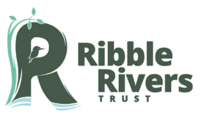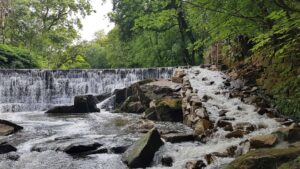The Ribble Rivers Trust has just completed its first projects to restore Blackburn’s rivers, opening up more habitat for river wildlife around the town.
 Bypass channels have been constructed alongside two large weirs on Blackburn’s rivers near Hoghton Bottoms and Lower Darwen to allow fish like trout and eels to access 18 hectares of upstream river habitat for the first time in decades.
Bypass channels have been constructed alongside two large weirs on Blackburn’s rivers near Hoghton Bottoms and Lower Darwen to allow fish like trout and eels to access 18 hectares of upstream river habitat for the first time in decades.
The river conservation charity has been awarded grants from the European Regional Development Fund and the Heritage Lottery Fund (as part of its Ribble Life Together project), to deliver a programme of works to ‘re-naturalise’ and improve parts of the River Darwen and the River Roddlesworth at Feniscowles.
The weirs were originally built in Blackburn’s rivers to provide local mills with a water supply. The mills have since been demolished, however the weirs continued to damage the delicate ecology of the river by blocking the natural migration patterns of fish.
With greater communities of fish now able to inhabit new stretches of Blackburn’s rivers upstream of the weirs, other wildlife is likely to be attracted to the area, such as otters and kingfishers.
Jack Spees, CEO of the Ribble Rivers Trust comments “This work doesn’t just benefit aquatic animals, it’s good news for the people who live around Blackburn and Darwen too. As we improve the quality of Blackburn’s rivers there will be associated improvements to places like Witton Park, and the local communities should start to see more and more wildlife when they’re out in public spaces alongside the River Darwen. We hope this will encourage more people to visit, enjoy and value the rivers and green spaces of Blackburn”.
Restoration work is also planned for a section of the River Roddlesworth near Feniscowles in 2019. Efforts will focus on a section of river which currently flows through an underground culvert across the site of the former Star Paper Mill. This part of the river channel has not seen daylight since the mill was constructed in 1875 and is currently devoid of wildlife. The old mill has recently been demolished to make way for a housing development and the Ribble Trust is using the opportunity to return the river channel to a more natural state, in a bid to attract even more wildlife to the area.
It is hoped that further funding will be secured in the future to continue work to improve Blackburn’s rivers with the aim of seeing a return of iconic species such as the Atlantic salmon to Blackburn.
###


